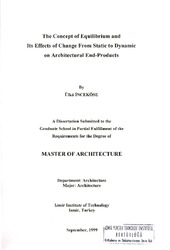Please use this identifier to cite or link to this item:
https://hdl.handle.net/11147/3966Full metadata record
| DC Field | Value | Language |
|---|---|---|
| dc.contributor.advisor | Eyüce, Özen | en |
| dc.contributor.author | İnceköse, Ülkü | - |
| dc.date.accessioned | 2014-07-22T13:52:50Z | - |
| dc.date.available | 2014-07-22T13:52:50Z | - |
| dc.date.issued | 1999 | en |
| dc.identifier.uri | http://hdl.handle.net/11147/3966 | - |
| dc.description | Thesis (Master)--İzmir Institute of Technology, Architecture, İzmir, 1999 | en |
| dc.description | Includes bibliographical references (leaves: 108-114) | en |
| dc.description | Text in English; Abstract: Turkish and English | en |
| dc.description | xiv, 114 leaves | en |
| dc.description.abstract | All of the objectslbuildings on the earth can stand due to their structural orders.Standing of a structural order without suffering any damage (broken down, collapsing ... ) is the result of their state of equilibrium. The most important factor effecting the state of equilibrium of any structural order is the force of gravity.Differantiation in the structural orders formed under this stable effect can be explained by the change in the concept of equilibrium. Therefore, analysing the change in architectural and engineering end-products could only be done by understanding the change in the concept of equilibrium.Scientific developments are the basic factors causing the changes in the concept of equilibrium. Reflections of these developments on concrete products is both in the types of load transfer of structural order and in visual expression of order.Consequently, in the scope of the thesis, depending on developments in the science reflections of the change in the concept of equilibrium on concrete products is tried to be explained by structural and geometrical analses. Expression of these analyses are made through the relationship between equilibrium and movement. It is concluded that the change in the structural orders basing on an acceptance of basic physics that "an object is either stable or movable "; is from structures having no motion to structures having any kind of motion (having tendency to move and/or moving). In other words, it can be said that, this change is from immobile structures having whole connection with the ground, to structures trying to remove from the ground.At the end, in today, it is possible to discuss about solutions having different equilibrium orders that is seen/will be seen basing on scientific developments.Generally it is possible to classify these solutions as solutions that can be expressed by different geometrical orders or solutions towards to be independent from the force of gravity.in the light of these determinations the aim of the thesis is to determine changes in the concept of equilibrium and to analyse their effects on structural end-products and to give some clues about their future effects.Keywords: Structural equilibrium, structural balance, gravity, geometry, energy, structural order. | en |
| dc.language.iso | en | en_US |
| dc.publisher | Izmir Institute of Technology | en_US |
| dc.rights | info:eu-repo/semantics/openAccess | en_US |
| dc.subject.lcc | TA645 .I53 1999 | en |
| dc.subject.lcsh | Structural analysis (Engineering) | en |
| dc.subject.lcsh | Geometry in architecture | en |
| dc.subject.lcsh | Equilibrium | en |
| dc.subject.lcsh | Gravity | en |
| dc.title | The concept of equilibrium and its effects of change from static to dynamic on architectural end-products | en_US |
| dc.type | Master Thesis | en_US |
| dc.institutionauthor | İnceköse, Ülkü | - |
| dc.department | Thesis (Master)--İzmir Institute of Technology, Architecture | en_US |
| dc.relation.publicationcategory | Tez | en_US |
| item.fulltext | With Fulltext | - |
| item.grantfulltext | open | - |
| item.languageiso639-1 | en | - |
| item.openairecristype | http://purl.org/coar/resource_type/c_18cf | - |
| item.cerifentitytype | Publications | - |
| item.openairetype | Master Thesis | - |
| crisitem.author.dept | 02.02. Department of Architecture | - |
| Appears in Collections: | Master Degree / Yüksek Lisans Tezleri | |
Files in This Item:
| File | Description | Size | Format | |
|---|---|---|---|---|
| T000066.pdf | MasterThesis | 63.89 MB | Adobe PDF |  View/Open |
CORE Recommender
Page view(s)
500
checked on Nov 18, 2024
Download(s)
166
checked on Nov 18, 2024
Google ScholarTM
Check
Items in GCRIS Repository are protected by copyright, with all rights reserved, unless otherwise indicated.